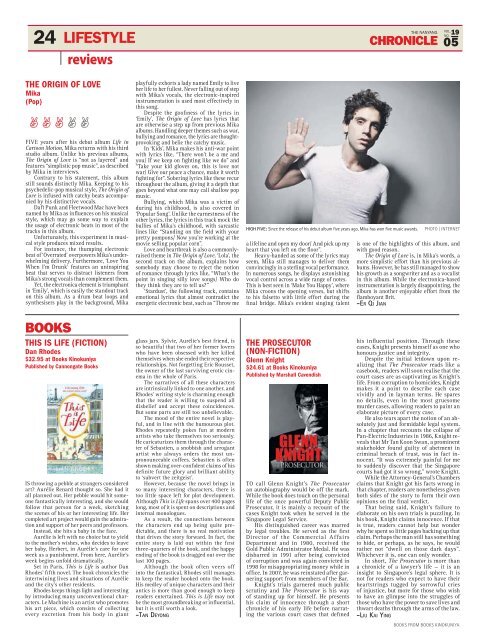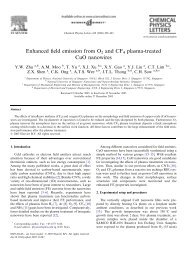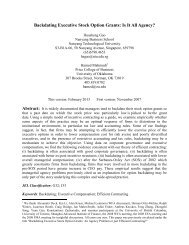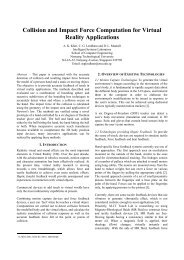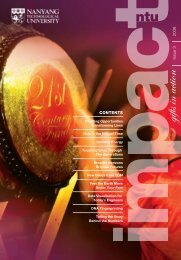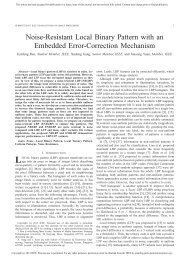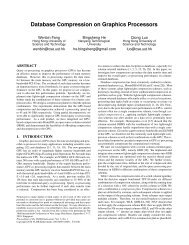HORROR - Nanyang Technological University
HORROR - Nanyang Technological University
HORROR - Nanyang Technological University
You also want an ePaper? Increase the reach of your titles
YUMPU automatically turns print PDFs into web optimized ePapers that Google loves.
24<br />
LIFESTYLE<br />
<br />
<br />
CHRONICLE<br />
19<br />
<br />
18<br />
05<br />
THE ORIGIN OF LOVE<br />
Mika<br />
(Pop)<br />
<br />
FIVE years after his debut album Life in<br />
Cartoon Motion, Mika returns with his third<br />
studio album. Unlike his previous albums,<br />
The Origin of Love is “not as layered” and<br />
features “simplistic pop music”, as described<br />
by Mika in interviews.<br />
Contrary to his statement, this album<br />
still sounds distinctly Mika. Keeping to his<br />
psychedelic-pop musical style, The Origin of<br />
Love is infused with catchy beats accompanied<br />
by his distinctive vocals.<br />
Daft Punk and Fleetwood Mac have been<br />
named by Mika as influences on his musical<br />
style, which may go some way to explain<br />
the usage of electronic beats in most of the<br />
tracks in this album.<br />
Unfortunately, this experiment in musical<br />
style produces mixed results.<br />
For instance, the thumping electronic<br />
beat of ‘Overrated’ overpowers Mika’s underwhelming<br />
delivery. Furthermore, ‘Love You<br />
When I’m Drunk’ features an uninspiring<br />
beat that serves to distract listeners from<br />
Mika’s strong vocals than complement them.<br />
Yet, the electronica element is triumphant<br />
in ‘Emily’, which is easily the standout track<br />
on this album. As a drum beat loops and<br />
synthesisers play in the background, Mika<br />
playfully exhorts a lady named Emily to live<br />
her life to her fullest. Never falling out of step<br />
with Mika’s vocals, the electronic-inspired<br />
instrumentation is used most effectively in<br />
this song.<br />
Despite the goofiness of the lyrics in<br />
‘Emily’, The Origin of Love has lyrics that<br />
are otherwise a step up from previous Mika<br />
albums. Handling deeper themes such as war,<br />
bullying and romance, the lyrics are thoughtprovoking<br />
and belie the catchy music.<br />
In ‘Kids’, Mika makes his anti-war point<br />
with lyrics like, “There won’t be a me and<br />
you/ If we keep on fighting like we do” and<br />
“Take your kid gloves on, this is love not<br />
war/ Give our peace a chance, make it worth<br />
fighting for”. Sobering lyrics like these recur<br />
throughout the album, giving it a depth that<br />
goes beyond what one may call shallow pop<br />
music.<br />
Bullying, which Mika was a victim of<br />
during his childhood, is also covered in<br />
‘Popular Song’. Unlike the earnestness of the<br />
other lyrics, the lyrics in this track mock the<br />
bullies of Mika’s childhood, with sarcastic<br />
lines like “Standing on the field with your<br />
pretty pompons/ Now you’re working at the<br />
movie selling popular corn”.<br />
Love and heartbreak is also a commonlyraised<br />
theme in The Origin of Love. ‘Lola’, the<br />
second track on the album, explains how<br />
somebody may choose to reject the notion<br />
of romance through lyrics like, “What’s the<br />
point in singing silly love songs/ Who do<br />
they think they are to tell us”<br />
‘Stardust’, the following track, contains<br />
emotional lyrics that almost contradict the<br />
energetic electronic beat, such as “Throw me<br />
HIGH FIVE: Since the release of his debut album five years ago, Mika has won five music awards. PHOTO | INTERNET<br />
a lifeline and open my door/ And pick up my<br />
heart that you left on the floor”.<br />
Heavy-handed as some of the lyrics may<br />
seem, Mika still manages to deliver them<br />
convincingly in a sterling vocal performance.<br />
In numerous songs, he displays astonishing<br />
vocal control across a wide range of notes.<br />
This is best seen in ‘Make You Happy’, where<br />
Mika croons the opening verses, but shifts<br />
to his falsetto with little effort during the<br />
final bridge. Mika’s evident singing talent<br />
is one of the highlights of this album, and<br />
with good reason.<br />
The Origin of Love is, in Mika’s words, a<br />
more simplistic effort than his previous albums.<br />
However, he has still managed to show<br />
his growth as a songwriter and as a vocalist<br />
in this album. While the electronica-based<br />
instrumentation is largely disappointing, the<br />
album is another enjoyable effort from the<br />
flamboyant Brit.<br />
-ER QI JIAN<br />
BOOKS<br />
THIS IS LIFE (FICTION)<br />
Dan Rhodes<br />
$32.95 at Books Kinokuniya<br />
Published by Cannongate Books<br />
IS throwing a pebble at strangers considered<br />
art Aurélie Renard thought so. She had it<br />
all planned out. Her pebble would hit someone<br />
fantastically interesting, and she would<br />
follow that person for a week, sketching<br />
the scenes of his or her interesting life. Her<br />
completed art project would gain the admiration<br />
and support of her peers and professors.<br />
Instead, she hits a baby in the face.<br />
Aurélie is left with no choice but to yield<br />
to the mother’s wishes, who decides to leave<br />
her baby, Herbert, in Aurélie’s care for one<br />
week as a punishment. From here, Aurélie’s<br />
week begins unfold dramatically.<br />
Set in Paris, This is Life is author Dan<br />
Rhodes’ fifth novel. The book chronicles the<br />
intertwining lives and situations of Aurélie<br />
and the city’s other residents.<br />
Rhodes keeps things light and interesting<br />
by introducing many unconventional characters.<br />
Le Machine is an artist who promotes<br />
his art piece, which consists of collecting<br />
every excretion from his body in giant<br />
glass jars. Sylvie, Aurélie’s best friend, is<br />
so beautiful that two of her former lovers<br />
who have been obsessed with her killed<br />
themselves when she ended their respective<br />
relationships. Not forgetting Eric Rousset,<br />
the owner of the last surviving erotic cinema<br />
in the whole of Paris.<br />
The narratives of all these characters<br />
are intrinsically linked to one another, and<br />
Rhodes’ writing style is charming enough<br />
that the reader is willing to suspend all<br />
disbelief and accept these coincidences.<br />
But some parts are still too unbelievable.<br />
The mood of the entire novel is playful,<br />
and in line with the humourous plot.<br />
Rhodes repeatedly pokes fun at modern<br />
artists who take themselves too seriously.<br />
He caricaturizes them through the character<br />
of Sebastien, a snobbish and arrogant<br />
artist who always orders the most unpronounceable<br />
coffees. Sebastien is often<br />
shown making over-confident claims of his<br />
definite future glory and brilliant ability<br />
to ‘subvert the zeitgeist’.<br />
However, because the novel brings in<br />
so many interesting characters, there is<br />
too little space left for plot development.<br />
Although This is Life spans over 400 pages<br />
long, most of it is spent on descriptions and<br />
internal monologues.<br />
As a result, the connections between<br />
the characters end up being quite predictable,<br />
and there is no real motivation<br />
that drives the story forward. In fact, the<br />
entire story is laid out within the first<br />
three-quarters of the book, and the happy<br />
ending of the book is dragged out over the<br />
last 100 pages.<br />
Although the book often veers off<br />
into the fantastical, Rhodes still manages<br />
to keep the reader hooked onto the book.<br />
His medley of unique characters and their<br />
antics is more than good enough to keep<br />
readers entertained. This is Life may not<br />
be the most groundbreaking or influential,<br />
but it is still worth a look.<br />
-TAN DEYONG<br />
THE PROSECUTOR<br />
(NON-FICTION)<br />
Glenn Knight<br />
$24.61 at Books Kinokuniya<br />
Published by Marshall Cavendish<br />
TO call Glenn Knight’s The Prosecutor<br />
an autobiography would be off the mark.<br />
While the book does touch on the personal<br />
life of the once powerful Deputy Public<br />
Prosecutor, it is mainly a recount of the<br />
cases Knight took when he served in the<br />
Singapore Legal Service.<br />
His distinguished career was marred<br />
by legal troubles. He served as the first<br />
Director of the Commercial Affairs<br />
Department and in 1980, received the<br />
Gold Public Administrator Medal. He was<br />
disbarred in 1991 after being convicted<br />
of corruption and was again convicted in<br />
1998 for misappropriating money while in<br />
office. In 2007, he was reinstated after garnering<br />
support from members of the Bar.<br />
Knight’s trials garnered much public<br />
scrutiny and The Prosecutor is his way<br />
of standing up for himself. He presents<br />
his claim of innocence through a short<br />
chronicle of his early life before narrating<br />
the various court cases that defined<br />
his influential position. Through these<br />
cases, Knight presents himself as one who<br />
honours justice and integrity.<br />
Despite the initial letdown upon realizing<br />
that The Prosecutor reads like a<br />
casebook, readers will soon realise that the<br />
court cases are as captivating as Knight’s<br />
life. From corruption to homicides, Knight<br />
makes it a point to describe each case<br />
vividly and in layman terms. He spares<br />
no details, even in the most gruesome<br />
murder cases, allowing readers to paint an<br />
elaborate picture of every case.<br />
He also tears apart the notion of an absolutely<br />
just and formidable legal system.<br />
In a chapter that recounts the collapse of<br />
Pan-Electric Industries in 1986, Knight reveals<br />
that Mr Tan Koon Swan, a prominent<br />
stakeholder found guilty of abetment in<br />
criminal breach of trust, was in fact innocent.<br />
“It was extremely painful for me<br />
to suddenly discover that the Singapore<br />
courts had got it so wrong,” wrote Knight.<br />
While the Attorney-General’s Chambers<br />
claims that Knight got his facts wrong in<br />
that chapter, readers are nonetheless given<br />
both sides of the story to form their own<br />
opinions on the final verdict.<br />
That being said, Knight’s failure to<br />
elaborate on his own trials is puzzling. In<br />
his book, Knight claims innocence. If that<br />
is true, readers cannot help but wonder<br />
why he spent so little pages backing up that<br />
claim. Perhaps the man still has something<br />
to hide, or perhaps, as he says, he would<br />
rather not “dwell on those dark days”.<br />
Whichever it is, one can only wonder.<br />
In short, The Prosecutor is more than<br />
a chronicle of a lawyer’s life — it is an<br />
insight to Singapore’s legal sphere. It is<br />
not for readers who expect to have their<br />
heartstrings tugged by sorrowful cries<br />
of injustice, but more for those who wish<br />
to have an glimpse into the struggles of<br />
those who have the power to save lives and<br />
thwart deaths through the arms of the law.<br />
-LIU KAI YING<br />
BOOKS FROM BOOKS KINOKUNIYA


